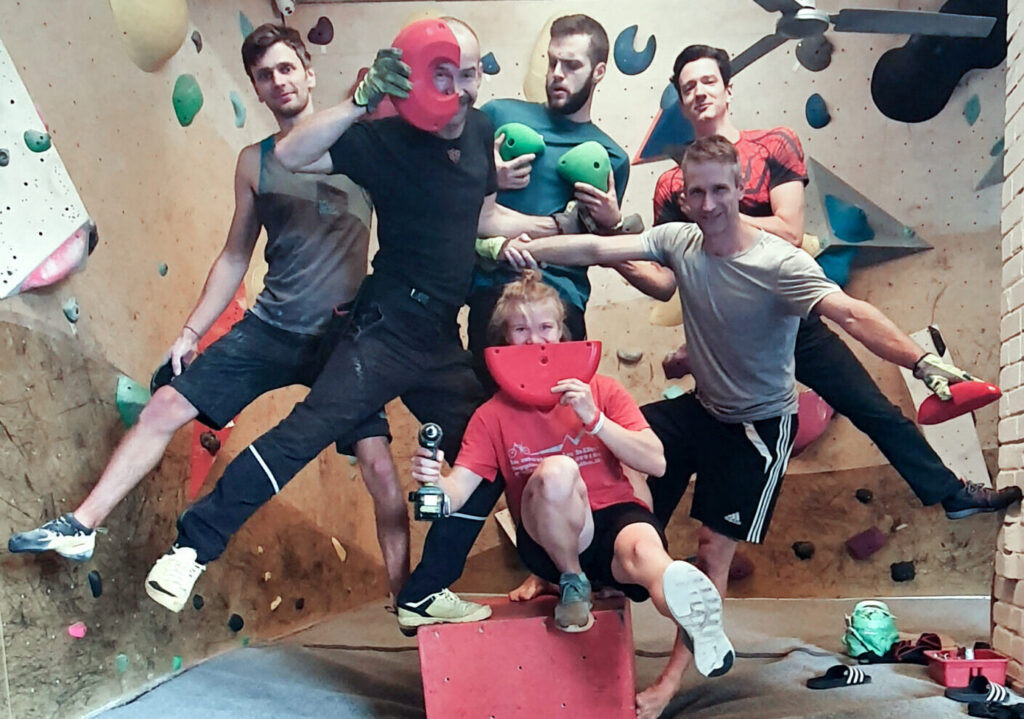How did we end up at Hippodrome?
In March 2019, I organized my birthday party at the Kaberneeme RMK campfire site. I invited 500 of my closest Facebook friends, because Facebook doesn’t allow inviting more than 500 people. As expected, less than 10% of the invitees showed up. The programme included the opening of the grilling season, a tent sauna, winter swimming and acro yoga. One of the old acquaintances who showed up told that he hadn’t had a chance to go climbing in the Zelluloos gym (the history of Ronimisministeerium dates back to 2014, when we opened our first gym in what is now called the Fahle quarter). I told him he had two months before the gym was going to be demolished. To his question: “Where are we moving?” I had only a vague answer: “Somewhere outdoors.” He then mentioned his old horse stable, which he couldn’t figure out what to do with.
The next day I went to see the building. A dilapidated and miserable house was staring back at me. All the windows were shut with bricks and inside there were two camp fire places left behind by some homeless people. In the attic there were several small and one large hole in the roof under which grew moss and trees. The owner talked about a small and big fire. In addition, the owner was harassed by municipal police which was fining him for the rubbish and leaking oil barrels in the yard. The building had even gotten into the news because of the youth having rioted there and the police having been sent to disperse them. I decided in an instant that this would be the future home of Estonian climbing!
Ronimisministeerium moved into this beauty two months later. When moving from one apartment to another, it seems that there are crazy many things. Taking a climbing hall into pieces and moving it to another address is a war situation! A truck with a garbage bin had to be rented and the driver had to drive for several trips before everything that could be taken, was taken. Merciless construction began.
The climbing walls were built in a 5-degree warm, pitch-dark gym, although it was already beautiful spring weather outside. The wall-building ninjas had come not only from Estonia, but also from Russia and Finland, and after only three weeks it was possible to climb. Record time!
Yet, there was nothing else besides walls and mats at the gym. Jarmo, a former owner of the Boulderkeskus, who came to set up the access system, said after a short walk around the building, “This is the strangest thing I’ve seen in a long time.” I gave my best shot to take it as a compliment. After a while, he tried to smooth out his words and said, “This is going to be a better climbing gym than Zelluloos.” It was already clearly easier to hear.
After the ninjas left, the general construction began. I bought 70 liters of out-of-date paint from hardware store with the same discount and rented a paint sprayer for the first time in my life. After 6 hours of painting, the work was done. Powerful tool! The owner of the building had contacts of a small construction company which had poured the floor of the building and done other small things tasks. We shook hands with them on the installation of windows, and the same company also made the best offer on replacing the roof.
Pretty soon, the company’s project manager turned out to be a professional drunk, with his construction brigade being his evening drinking buddies. Immediately after cutting the window openings, the project manager disappeared with his team for a week. Since I didn’t want to pay the guard to sleep on the construction site, I camped out for a week on crash pads until another set of builders installed the windows. Neighbors’ stories about the thieves turned out to be largely unfounded – only a few mornings I found an empty pack of ham on the floor with a cat’s tooth marks.
When the first customers arrived and asked where the toilets were, they were advised to look where the horses go and follow their example. There were different opinions about sewerage. The manager of the Hipodrom race track thought that the building might not have a sewer, but the owner of the building vaguely remembered to having gone into the building for number two.
A few weeks later, we made sanitary progress by finding the end of a sewer pipe hidden under the concrete pour. We placed the toilet seat on the pipe and connected it to water with a garden hose. Since the toilet bowl was located opposite the entrance, we built temporary walls from foam mats. We did not install a door on the toilet, but instead placed within arm’s reach a Finnish bouldering topo so that a visitor would have something to read or to throw should someone approach at the wrong time. It was time to make a soft launch!
Summer is a low season for indoor sports and there were not many climbers. However, the income left by the few visitors helped a lot because the builders had to be paid. Thank you! A considerable number of volunteers also came by. Not only did the helping hands speed up the work, but they also gave a big moral boost – except for Märt (name changed), who looked around anxiously and said, “Michael, you’re going to die here!” I am still grateful to all of you – except for Märt.
Finally, the project manager returned with his tail between his legs and started demolishing the roof. While looking at the couple hundred m2 hole from the yard, the project manager came to me and reassured me that he wouldn’t leave me in trouble this time. That was the last time I saw him.
Fortunately, a retired electrician who watched the situation sympathized with me and said, “Mikael, I see you are left in trouble. I have also been left in trouble in my life. If you want, I’ll take over the roof project.” You do not have to offer to a desperate person too many times.
Since the electrician didn’t have his own construction brigade, and the drunkard project manager’s drunkard builders were present, the electrician said to the men, “Today is Friday and your payday. You’re all waiting for your money, but your boss is missing. I’ll pay you half of your wages out of my own pocket, and if you come tomorrow, I’ll pay you the other half.” Half the men came back. The other half stayed behind with the project manager to drink the advance payment that had been given to buy roofing materials.
Work continued with those who arrived and did not have to be sent home to sober up. From the construction time, there are seemingly unreal stories – who broke his leg on the way to the toilet; who got probation but didn’t learn and went to prison for a year at the end of the summer; who was able to capsize a rented mini-tractor; who had a ladder slip out from under him; who gained access to his recently deceased father’s bank account and discovered that, as a result of a sad family event, he had suddenly become the owner of a € 50 000/month cash-flow from a factory located in Russia, and so on. – But let’s move on, because the building is not ready yet.
The roof was replaced and the construction of the changing rooms began. The toilet got proper walls and a door, and at the beginning of autumn the Ukrainian tiling master completed the showers and sauna. For the tiling works he asked me to pay in bitcoins, but quickly realized from seeing my jaw drop to the floor that unfortunately he had to settle with euros. A cleaning company was hired by the end of the summer because the owner was not satisfied with how the CEO was cleaning. Things started to fall in place.
This type of wrestle has groomed Hippodrome into a “Countryside in the middle of the city”-type of gym it is today – with horses and a garden that has become so dear.
How did an outdoor climbing wall become a greenhouse?
During the construction of the climbing gym, Estonian slackline legend Tauri Vahesaar flew in and asked if he could fix up the courtyard with his own money and in return build there a slackline park. I couldn't understand why anyone would want to fix up our yard for free, but as soon as I almost nodded, there were men with rakes scraping sand and mulch around from heaps that had been ordered. This work immediately changed the character of the Hipodroom courtyard. Thank you Tauri!
The following spring, corona arrived to Tallinn from China and Dan Buckleitner from America. Even before the beer virus outbreak, I had been thinking about building an outdoor climbing wall, and as the government declared a "ban to do business" it felt like a perfect moment to focus on something positive. At the beginning of the construction of the outside wall, a guy walked up and asked in English, "Is there anything I could do to help?" I said "Yes", and as he walked away he replied, "Maybe I'll come by some day then." Dan came, and during the building process, it became clear that Dan knew a thing or two about plants - he'd had a farm for a couple of years until he realised that, paradoxically, growing food doesn't put food on the table.
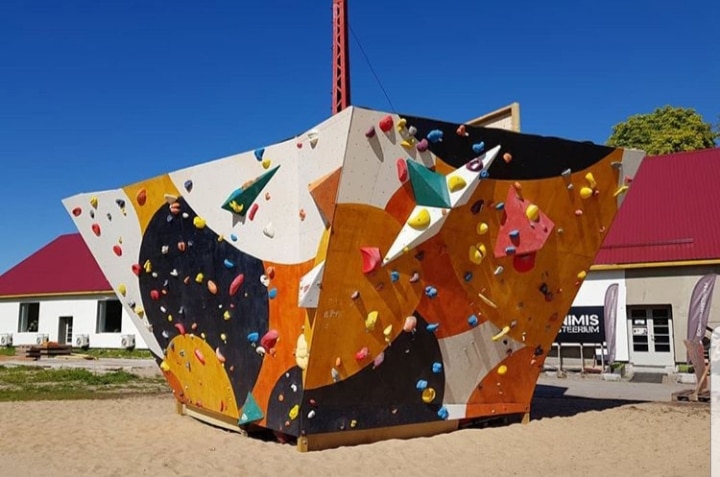
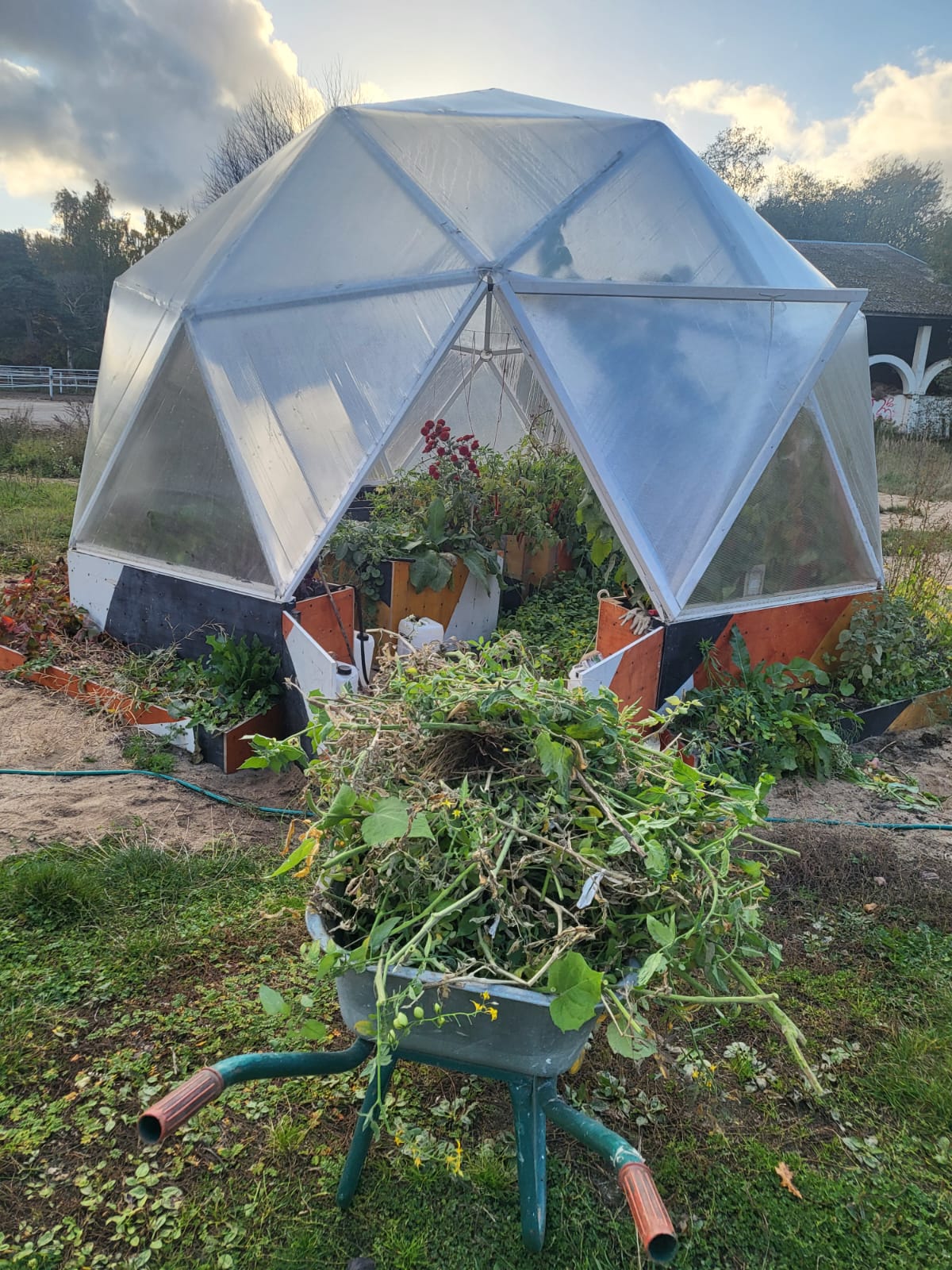
Digging in with Dan and Kätlin - Dan's reason for coming to Estonia - we realised that the ground was mostly made up of construction waste. Farmer Dan was quick to share that planting potatoes between bricks wouldn't bring hoped for results, and we'd have to build beds on top of the existing soil. We mixed together slightly poorer soil from a heap standing at the edge of the plot, horse manure and straw (for geographical reasons the latter two were in infinite supply), and so the gardening at Hipodroom had begun. Thank you Dan!
After the first year, we expanded the number of beds and a few new faces joined. We ordered our first load of real soil and got a decent amount of mulch through Andreas, who had just become an arborist and dumped a chopped tree into our yard. Thank you Andreas!
On the third year, a fellow climber hinted that it was possible to apply for a grant from the City of Tallinn for establishing a community garden. I looked into it, filled in the application and got a positive decision. The application focused on the construction of a greenhouse for which the best place was where we had built the outdoor climbing wall. As the outdoor climbing wall proved less popular than hoped - people found it to be inconvenient to carry crash pads out to the yard, it felt scary to fall on crash pads and there were more routes in the gym - the outdoor wall was demolished. In addition to the greenhouse, there was enough plywood for flower boxes, garden tables and a spray wall. After these works, practically all the outdoor wall plywood and frame beams had found a new meaning for their existence. This helped us take a big step forward in horticulture, both in terms of opportunities and the number of gardening enthusiasts.
The following season we applied for and received a grant again, and this time the most visible changes were starting beekeeping and planting fruit trees. Thank you Tallinn Urban Environment and Public Works Department!

Going to Tartu, leaving, going there again and future projects
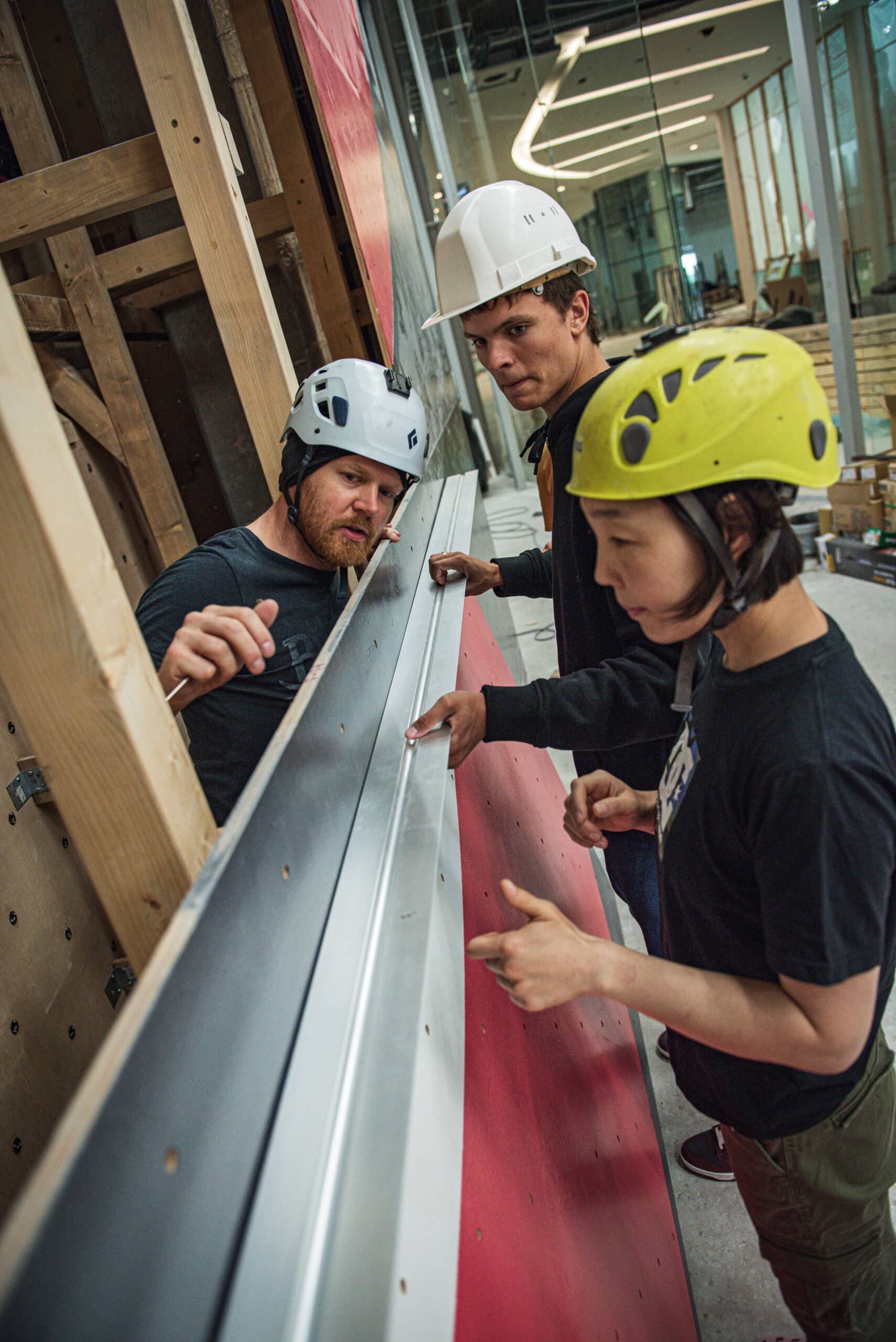
A little over a year after the opening of the Hipodroom gym, in autumn 2020, I agreed to fund the construction of Tehase Street bouldering gym in Tartu. The vision was to develop Estonian climbing together with CEO of Tartu gym. However, as it became clear during the first year that in practice there was no cooperation, we started negotiating the buy-out of one or the other party. An agreement was reached, which resulted in the Tehase gym becoming in January 2023 Ronimistehas. The proceeds of the sale were used to finance part of the construction of the Ronimisministeerium gym at the T1 shopping centre.
The re-entry of Ronimisministeerium to Tartu happened unexpectedly - three months after signing the sale of the Tartu gym, I received a call from the owner of NET Spordihall. He had long planned with locals to build a rope climbing wall in upcoming, state-of-the-art sports centre, but the parties had in the end failed to agree on the terms. Initially I offered to be in contact with someone else, but as the original concept could be changed and the terms the owner offered seemed very reasonable, I agreed. It will be very interesting to see how Estonia's first 100% self-belay wall will be received!
Looking to the future, it is clear that there are still new chapters to come in the story of the Ronimisministeerium. More and more people are realising that they are actually climbers, and all the joy I see at Ronimisministeerium gives my work a deep meaning. Tallinn is missing a proper rope climbing wall and as soon as space is found, it's again construction time.
Rock hard!
Mikael
